How would you like to start a business off with lots of high quality recommendations? When you get a cleaning certificate, you’re doing exactly that—and you build a good rapport for your business early.
A cleaning certificate is a great way to show customers that you are a professional cleaning company. They also give you access to marketing tools and other benefits that will help your cleaning company. In addition, they provide links to your website from industry experts. You can’t beat that!
We’ll discuss the benefits of cleaning certificates, the process of getting a cleaning certificate, and the different organizations that offer cleaning certificates. We’ll share more than 45 cleaning certifications that you can choose to develop skills and increase your brand value.
Should I Get a Cleaning Certificate?
If you are in the cleaning industry or thinking about starting a cleaning business, you might want to become a certified cleaner. Completing a course and test can help you because:
- You’ll save money by reducing the amount of wasted and damaged supplies.
- Proper safety training will reduce on-the-job injuries.
- You’ll learn more efficient ways to clean.
- Each certification communicates that you adhere to industry best practices.
- Most certifications come with brand assets you can use in marketing.
- As a member of the certifying organization, you will receive a high-quality backlink to your website. Most top-performing cleaning companies have hundreds or thousands of backlinks. The ones you can get fairly easily are worth getting.
- People pay more for better quality.
All of these combine to give you a competitive advantage. You’ll be able to use your industry knowledge, safety training, and marketing tools in a way that you can compete even if you do not offer the most affordable price.
Next, let’s look at the process of choosing a certification.
How to Get Cleaning Certifications
Cleaning industry organizations expect you to complete specific steps before receiving a cleaning certificate. The certification process follows these steps:
- Compare cleaning certifications to verify you meet the requirements.
- Become a member of the industry group.
- Take certification course(s) or independently study for the certification exam.
- Take the certification exam.
- Become a certified cleaning professional.
- Take continuing education courses to maintain your certification.
There will be some differences in how each company handles these steps. We’ll look at each step, so you know what to consider.
Compare cleaning industry certifications
You’ll want to compare cleaning certifications based on the following factors:
- What is the reputation of the organization?
- Is the certificate and training relevant to your cleaning business?
- How much experience or education does the certificate require?
- Does the certification require you to take a specific cleaning certification class or can you study independently?
- Will the course be a specific length or at your own pace?
- Is the exam timed or at your own pace?
- What is a passing score? Most exams are 70%, but some are as high as 85%, while others are compared to other test takers.
- Can you get the cleaning certification online or do you have to take a proctored exam?
- Do you have to be a member to take the exam? Is there a discount for joining?
We’ll answer most of these questions when discussing the best cleaning certification programs. Next, we’ll discuss becoming a member of the industry group.
Should I join cleaning organizations?
Yes. They can be highly beneficial. Most of them are fairly inexpensive for the basic membership version, and you get benefits like:
- Discounts on software for your cleaning business
- A publicly viewable member profile
- Free online cleaning courses with continuing education credits
- Discounts on certification exams
- Updates on workplace safety and government regulations
- Discounts to annual conferences and in-person housekeeper training
- Free branding materials
- A high-quality backlink to your cleaning business
Most memberships pay for themselves. I strongly suggest you consider investing in them to fast-track your business.
Study for the cleaning exam

Most of the tests will not be so easy that you can pass them without studying. They will either have online classes, in-person classes, or suggested study materials. I suggest you use them. A combination of online and suggested reading normally works best for the cleaning certifications you might pursue.
Some courses like the Occupational Safety and Health Administration Specialist Certificate Program require 68 total course hours. At the same time, other certifications do not have a time requirement before you take the certification test.
Next, it’s time to take the cleaning test.
Take the certification test
To get a certificate in cleaning you will always have to pass a test. The tests are normally timed, multiple-choice, and require a score of 70+ to pass. Depending on whether the cleaning classes and the exam are packed together, you may be able to take the exam at home or in the same classroom where you took the classes. You’ll need to schedule the cleaning test and pay the certification testing fee if they are not packaged together.
Now you are certified

Assuming you passed the cleaning business certification test, you will receive your certificate. The company will either provide an online certificate or mail the cleaner certificate to you. There’s one more thing, though.
Continuing education credits
Some certifications will require you to submit proof of completion of cleaning certificate courses each year to remain certified cleaners. This is where the memberships pay for themselves. Each course is normally $50+, while memberships usually cost less than the total of all the continuing education.
Don’t Make These Mistakes… Make $140K per MONTH! |
|
| We worked with Chris Mondragon on a special course where he shares all his secrets and his biggest mistakes so that YOU can create a successful business right from the start. See it all in our 63-course program in the UpFlip Academy! Chris breaks down what to do first and provides expert industry advice about owning a top-rated cleaning business. Don’t wait—learn from the best when you sign up TODAY! | |
| Join the UpFlip Academy! |
Organizations Offering Cleaning Certifications

Cleaning services can cover a broad spectrum of skills. What certifications you’ll want or need will vary based on your own cleaning business. The primary organizations that offer certifications for cleaners are:
- International Janitorial Cleaning Services Association (IJCSA)
- Occupational Safety & Health Administration (OSHA)
- International Sanitary Supply Association (ISSA)
- Institute of Inspection, Cleaning, and Restoration Certification (IICRC)
Free Cleaning Certificate Courses Online from IJCSA
If you are looking for a janitorial certification, consider becoming a certified janitor through the IJCSA. It’s one of the least expensive ways to get a commercial cleaning certification. In fact, you can get all 12 certification course offerings for the cost of the membership. That’s less than $20 per certification course.
The IJCSA requires a membership which you can get for around $250. If you are a cleaning business owner, I would suggest taking this approach to get the Master Certification for yourself and your management staff. Then have employees take the ones they specifically need including:
- Customer Service Certification: Softskills are critical to business success. Learn about customer-focused business practices.
- Chemical Hazards Certification: Learn how to read MSDS sheets.
- Bloodborne Pathogen Certification: This one is required for all businesses and employees before they start.
- Residential Cleaning Specialist: Focus on industry best practices for homes.
- Green Cleaning Certification: Learn how to actually comply with green cleaning requirements.
This is the closest you’ll get to free janitorial certification or free cleaning certification from a reputable training company.
| Certification | Study Time | Pace | Test Format | Test Time | Pre-reqs | Cost | Renewal Period | Notes |
| IJCSA Business Membership | N/A | N/A | N/A | N/A | N/A | Approximately $250 Per Year | Annually | Prereq to take certifications |
| IJCSA Master Certification (IMC) | 20 | 250 Questions including 110 essay plus oral questions | 4 | Must pass all other certifications first | Free with IJCSA Membership | Requires all other certifications | ||
| IJCSA Residential Cleaning Specialist (RCS) | 26 | Work at own pace | online | 4 | (CSC), (CHC), (BPC) | Free with IJCSA Membership | 3 years | Overview of house cleaning industry. It requires the customer service, bloodborne pathogens, and chemical hazards certifications |
| Carpet Cleaning Certification (CCC) | 10 | Work at own pace | online | 2 | Free with IJCSA Membership | |||
| Bloodborne Certification (BPC) | 1 | Required by Law Before Working | Online | 1 | Required by Law Before Working | Free with IJCSA Membership | 1 year | |
| IJCSA Janitorial Custodial Certification (JCC) | 10 | self paced | Online | 1 | Free with IJCSA Membership | |||
| Medical Cleaning Certification (MCC) | 40 | self paced | Online | 3 | Free with IJCSA Membership | |||
| Biohazard Cleaning Certification (BCC) | 40 | self paced | Online | 4 | Free with IJCSA Membership | If you want to clean crime scenes, this is the certification for you! Includes OSHA Hazwopper certification. | ||
| Mold Inspection & Remediation Services (MIRS) | 80 | Set time of 40 hours, but self paced. | Online | 2 | Free with IJCSA Membership | Able to legally perform mold remediation | ||
| Green Cleaning Certification (GCC) | 4 | self paced | Online | 1 | Free with IJCSA Membership | Adheres to ISO 9001, ISO 14001 and ISO 31000. May qualify to work on buildings with HACCP Standards Certification, ISO Certification, LEED Certification, and CFGS Certification. | ||
| Green Cleaning Masters Certification (GCMC) | 15 | self paced | 150 questions, 75 are essay questions | 3 | GCC, CHC | Free with IJCSA Membership | Tests for greater comprehension of green cleaning | |
| Chemical Hazards Certification (CHC) | 4 | self paced | 1 | Free with IJCSA Membership | Master the mechanics of MSDS sheet. | |||
| Customer Service Certification (CSC) | 1 | self paced | online | 0.5 | Free with IJCSA Membership | Freshen up your soft skills. Every cleaning company should require employees to go through customer service training at least once a year. | ||
| Complete All Courses | 231 | 26.5 | Free with IJCSA Membership | Effectively the same as one semester at full-time college. Allows you to work on most cleaning projects. |
Occupational Safety & Health Administration Certification
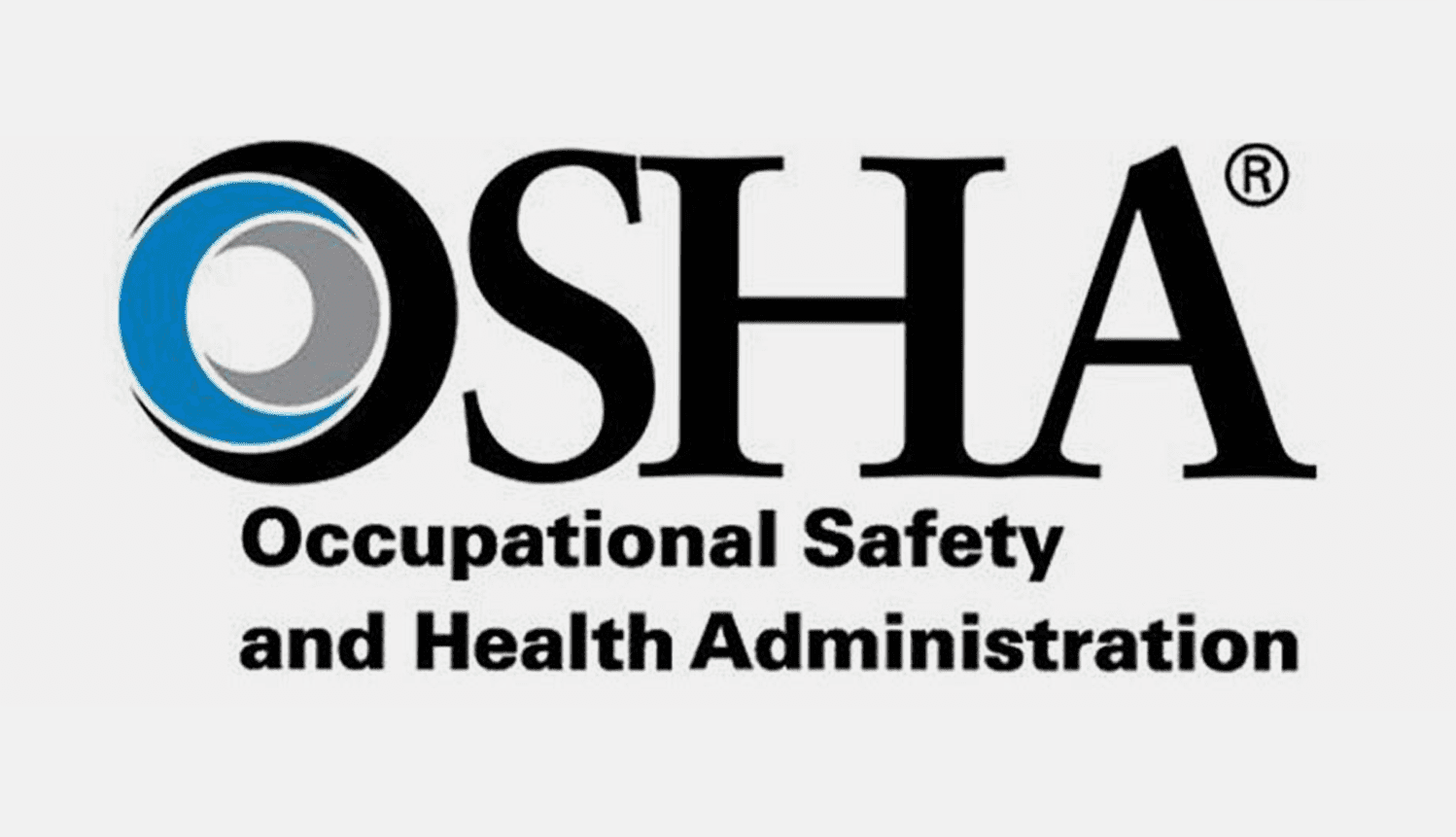
Occupational Safety & Health Administration (OSHA) offers three safety and health fundamental certifications that professional cleaners may need each employee to complete. The three certifications are for the :
- General industry: Good for working on commercial properties that require OSHA training.
- Construction industry: Needed if you’ll be doing construction cleanup on major construction sites.
- Maritime industry: Good for cleaning companies that will be cleaning or power washing boats.
If you aren’t working on large commercial properties, you might not be required to have these. It doesn’t hurt to have them, though. Let’s look at each.
General Industry Safety & Health Fundamentals Certificate Program

The Safety & Health Fundamentals for General Industry requires at least 68 hours across seven courses including:
- 39 hours in the following courses:
- OSHA #511: Occupational Safety & Health Standards for the General Industry (26 hours)
- OSHA #7500: Introduction to Safety & Health Management (5.5 hours)
- OSHA #7505: Introduction to Incident (Accident) Investigation (7.5 hours)
- Minimum of 29 elective hours across four of the courses listed on the general industry certificate webpage. Some that make sense for cleaning industries include:
- OSHA #7845: Recordkeeping Rule Seminar (4 hours)
- OSHA #7205: Health Hazard Awareness (6 hours)
- OSHA #7210: Pandemic Illness Preparedness (5.5 hours)
- OSHA #2255: Principles of Ergonomics (18 hours)
- OSHA #7215: Silica in Construction, Maritime, and General Industries (7 hours) Good if taking either of the other OSHA certificates.
Find courses that work for you on the Occupational Training Institute searchable course schedule.
Maritime Safety & Health Fundamentals Certificate Program

If you clean boats or other facilities on the water, you should consider taking the Safety & Health Fundamentals for Maritime certification. It requires a minimum of 77 hours including:
- 48 hours in the following courses:
- OSHA #5410: Occupational Safety & Health Standards for the Maritime Industry (35 hours)
- OSHA #7500: Introduction to Safety & Health Management (5.5 hours)
- OSHA #7505: Introduction to Incident (Accident) Investigation (7.5 hours)
- Minimum of 29 elective hours across four of the courses listed on the maritime industry certificate webpage. Some that make sense for maritime cleaning companies include:
- OSHA #3115: Fall Protection (18 hours). Working on the water creates challenges most cleaning companies don’t encounter.
- OSHA #7215: Silica in Construction, Maritime, and General Industries (7 hours). If you didn’t take this with the general industry certification, you probably should take it now.
- OSHA #7100: Introduction to Machinery and Machine Safeguarding (4 hours). Workers will probably be working around unique equipment. They should learn equipment safety.
- OSHA #7115: Lockout and Tagout (7.5 hours). Anyone working around electrical equipment should understand lockout and tagout. It protects against electrocution deaths.
Construction Safety & Health Fundamentals Certificate Program
Construction cleanup companies should consider getting the Safety & Health Fundamentals for Construction certification. It requires a minimum of 68 hours of training including:
- 39 hours in the following courses:
- OSHA #510: Occupational Safety & Health Standards for the Construction Industry (26 hours)
- OSHA #7500: Introduction to Safety & Health Management (5.5 hours)
- OSHA #7505: Introduction to Incident (Accident) Investigation (7.5 hours)
- Minimum of 29 elective hours across four of the courses listed on the general industry certificate webpage. Some that make sense for cleaning industries include:
- OSHA #7845: Recordkeeping Rule Seminar (4 hours)
- OSHA #7205: Health Hazard Awareness (6 hours)
- OSHA #3085: Principles of Scaffolding (22 hours). You’ll probably have to get on scaffolds to reach places that can’t be reached by a ladder.
- OSHA #7400: Occupational Noise Exposure (7.5 hours). Construction sites can damage the hearing. Make sure to understand how to protect yourself.
You should be able to get an OSHA cleaning certification online. Unless you are doing construction and maritime cleaning, I would not expect you to need more than one of these OSHA certifications. However, check with each property owner to establish their requirements for subcontractors.
International Sanitary Supply Association
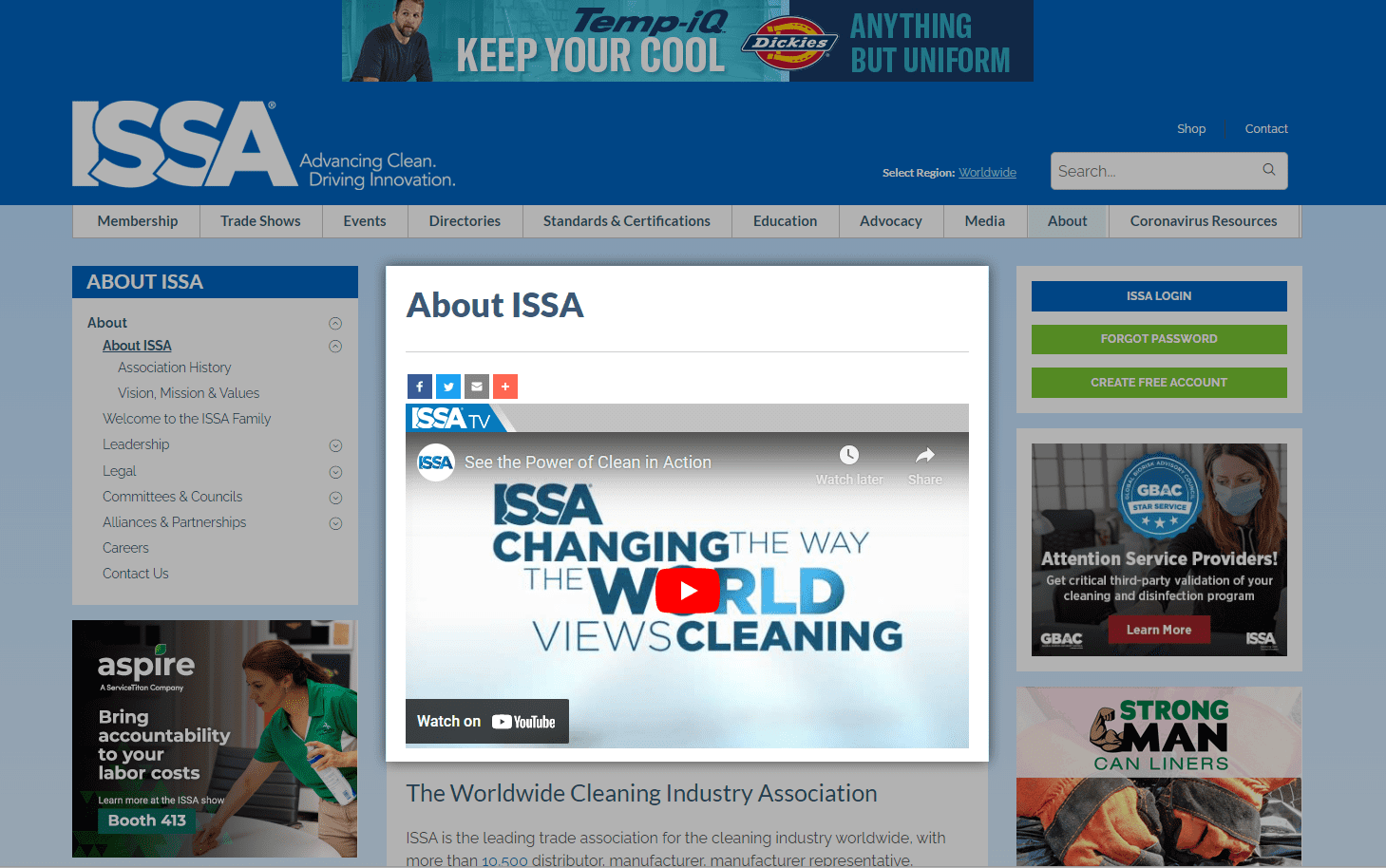
The ISSA has more than 10,500 members grouped into the following categories:
- Associated service members
- Building service contractors
- In-house service providers
- Distributors
- Manufacturers
- Manufacturer representatives
- Residential cleaners
You can get ISSA cleaning certifications and ISSA accreditation for your business through their subsidiaries:
- Cleaning Industry Management Standard (CIMS)
- Cleaning Management Institute (CMI)
- Association of Residential Cleaning Services International (ARCSI)
Commercial Cleaning Business Certificates from CIMS
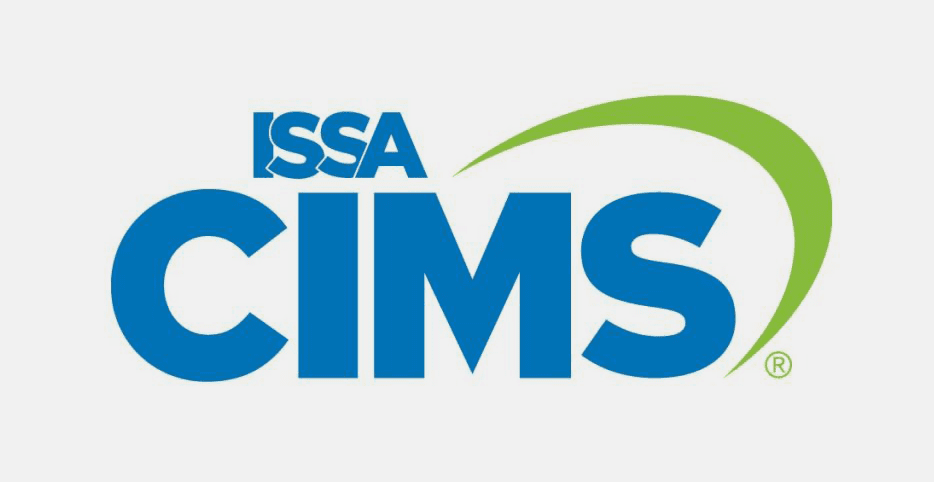
CIMS is a management standard for how to operate a cleaning business. They have two levels of certifications for a cleaning business:
- CIMS Certification: This cleaning business certification focuses on operations for building service contractors, in-house service providers, and facility managers.
- CIMS Green Building Certification: This cleaning business certification focuses on operations for facility managers, in-house service providers, and building service contractors that will be working on U.S. Green Building Council LEED Projects.
Both cleaning certifications require cleaning services to:
- Submit an application and a $500 (approximately) non-refundable fee.
- Create processes for the cleaning business that include written standards and proof of application for:
- Quality Control
- Service
- Human Resources
- Health, Safety, and Environmental Stewardship
- Management Commitment
- Equipment, Supplies, and Tool Policies
- Approve the assigned auditor for their cleaning services.
- Paying additional fees including:
- $995 (estimated) certification fee for ISSA members or $1,695 (estimated) for non-members
- Assessment fees based on complexity of the commercial cleaning business
- Expenses for the cleaning business auditor.
- Allow a CIMS Certification Expert to evaluate their business in person.
After this process is complete, you will be certified assuming you meet the standards, which you can find here. I would recommend taking the green building certification when you decide to pursue these cleaning certificates because there is no point in paying for the audits twice.
Cleaning Management Institute (CMI)

The Cleaning Management Institute offers numerous certifications for cleaning companies to prove their knowledge, but the most popular cleaning certification program is the Certified Custodial Technician. This certificate program has three levels of certification for the industry today. Here is an outline of the program:
- Basic version: Pay course fee (about $315), take the course, and score 80% or better on the exam. Learn more about the janitor certification.
- Advanced Clean Certification: Pass the basics course, pay another $315 (estimated), take a course on advanced techniques, and score 80% or higher to pass the CPI Custodial Advanced certification.
- CMI Custodial Expert: This 20 hour in-person ISSA cleaning certification requires completing the basic and advanced cleaning certificate online before you can participate in the program and become a certified janitorial expert. Find locations to take the cleaning course and advance your career.
You can also check out the free materials included in ISSA CMI Cleaning Professional 101.
How to Become a Certified House Cleaner with ARCSI Cleaning Business Certifications
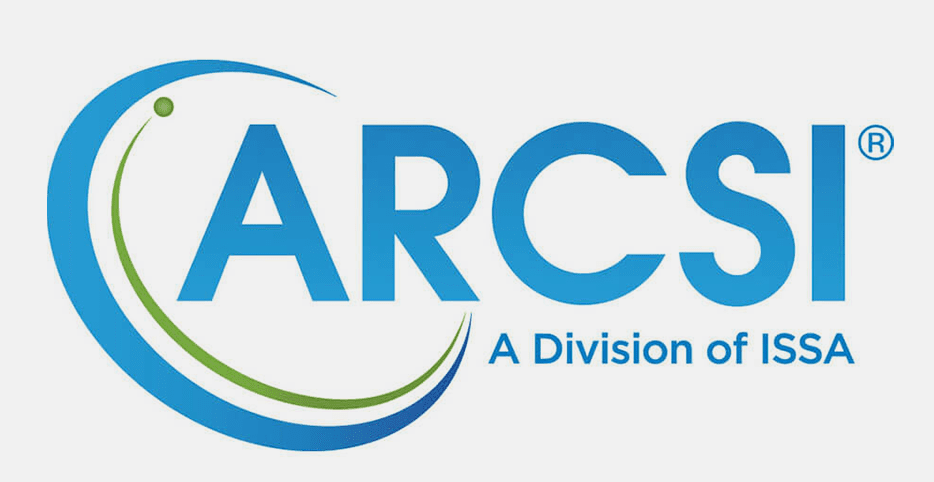
ARCSI is the residential cleaning arm of the ISSA and offers two cleaning certifications:
- ARCSI Professional House Cleaning certification (PHC): An eight-hour online certificate that covers the knowledge you need to clean homes. You can get a single online certificate or unlimited certifications for growing businesses. Take the PHC course on ISSA Learning Portal. Get more details about the residential cleaning certification.
- IICRC/ARCSI House Cleaning Technician Certification (HCT): The house cleaning technician training & certification is actually an IICRC certification, but the only available courses are from ARCSI. It claims to be both online and in-person, but the online course is not available at the time of writing. (The online certification course will become available in 2023). The course is $275 for IICRC and ARCSI members or $575 for non-members. There is also an $80 exam fee. Additional certifications are only $200 regardless of your member status.
- If you only get one exam, this would be a good one to choose because you’ll be listed on two major players’ websites if you become a member of each.
Institute of Inspection, Cleaning, and Restoration Certification (IICRC)
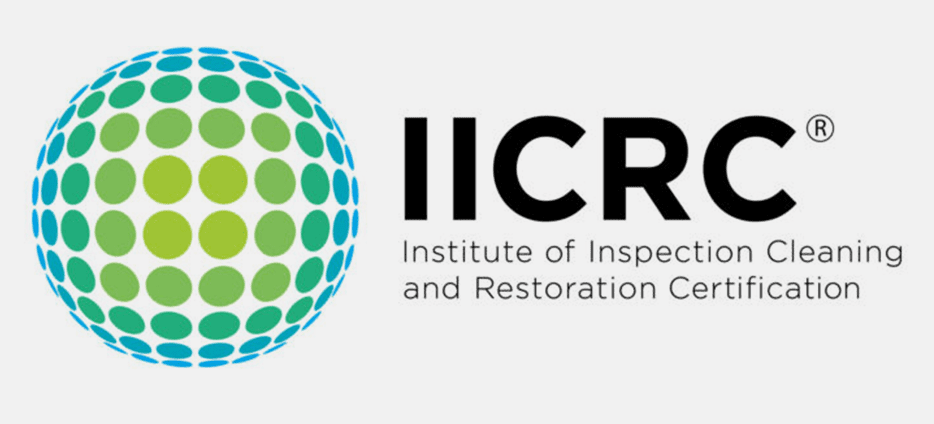
The IICRC mostly focuses on certifying inspection, cleaning, and restoring floors, carpet cleaning jobs, and other surfaces. They offer a house cleaning technician certification, which we discussed earlier, but some of their most noteworthy certificate of cleaning programs include the Master Designations. There are three master tracks including:
- Master Textile Cleaner (MTC)
- Master Fire and Smoke Restorer (MSR)
- Master Water Restorer (MWR)
Each of these programs shows an in-depth understanding of the techniques used for specialty cleaning jobs. They are sure to advance your career and help you make more money by offering better services and techniques than other successful cleaning businesses. Let’s look at how to become a master textile cleaner first.
How to become a Master Textile Cleaner
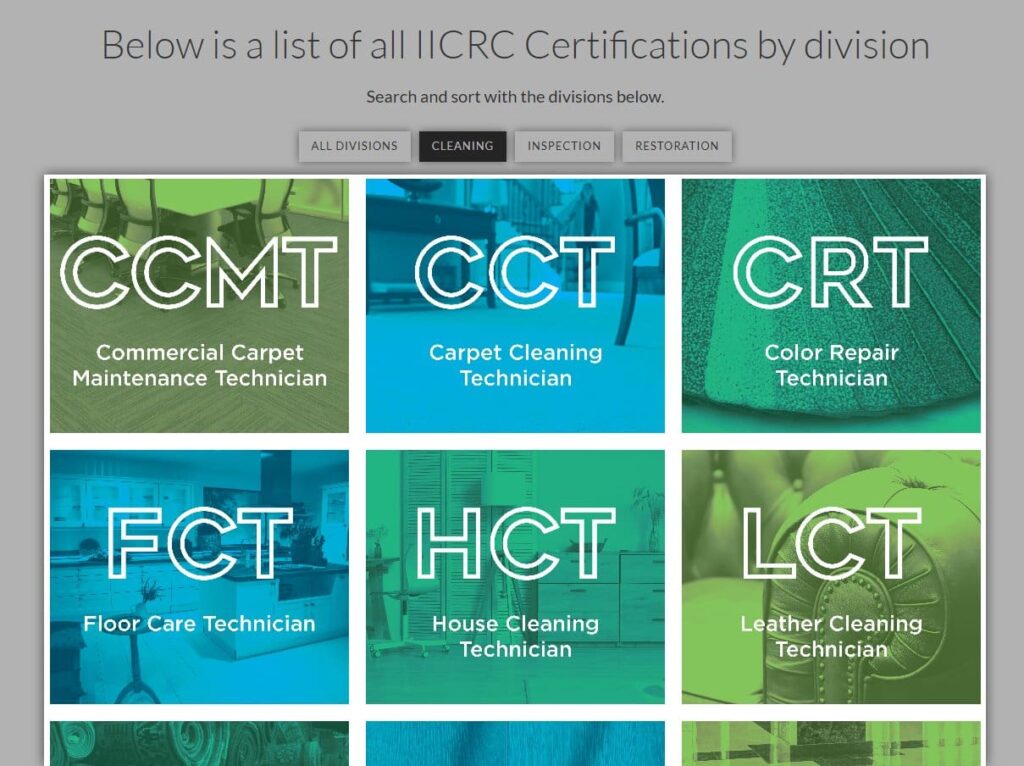
To become an IICRC Master Textile Cleaner requires five certifications plus three years as a certified cleaner. The IICRC requires the following five steps to achieve the Master Textile Cleaner (MTC) designation:
- Pass three certification tests:
- Carpet Cleaning Technician (CCT) or Commercial Carpet Maintenance Technician (CCMT): The CCT is focused on application of cleaning skills for carpeted floors and other surfaces, while the CCMT is focused on the management of floor cleaning.
- Upholstery and Fabric Cleaning Technician (UFT): This certification is focused on understanding fabric and cleaning challenges related to different methods and chemicals.
- Odor Control Technician (OCT), Carpet Repair and Reinstallation Technician (RRT), or Color Repair Technician (CRT): Choose one of the three. The OCT is also required for the MSR, while the RRT is required for the MWR. If you live in an area prone to floods, you might want to do the RRT first.
- After 12 months of IICRC certification, you obtain Journeyman Textile Cleaner (JTC) status.
- Complete the other two certifications from Step 1c.
- Complete three years of IICRC Certification.
- Become a Master Textile Cleaner (MTC).
Each certification runs about $80, so it will cost approximately $400 plus annual renewal fees and continuing education credit costs.
How to become a Master Water Restorer
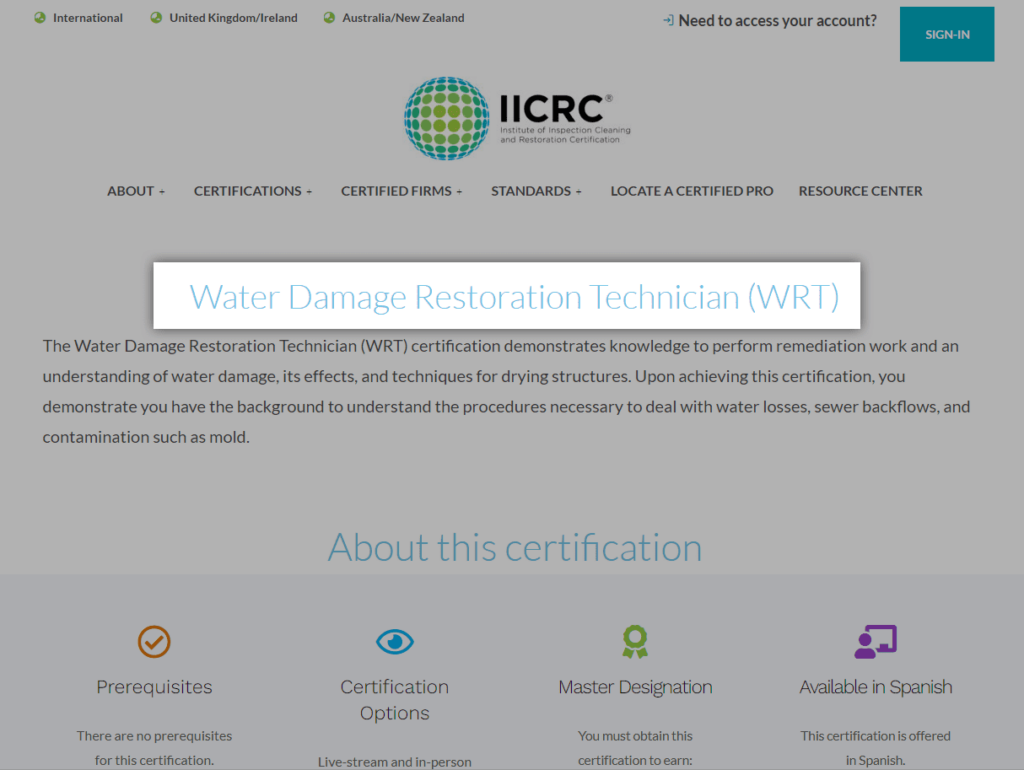
To become an IICRC Master Water Restorer requires five certifications plus three years as a certified cleaner. The IICRC requires the following five steps to achieve the Master Fire and Smoke Restorer (MSR) designation:
- Pass three certification tests:
- Carpet Cleaning Technician (CCT) or Commercial Carpet Maintenance Technician (CCMT): The CCT is focused on the application of cleaning skills for carpeted floors and other surfaces, while the CCMT is focused on the management of floor cleaning.
- Water Damage Restoration Technician (WRT): The WRT focuses on understanding the processes to repair property after water damage.
- Carpet Repair and Reinstallation Technician (RRT): The RRT teaches you how to remove and reattach carpet using industry best practices.
- After 12 months of IICRC certification, you obtain Journeyman Water Restorer (JWR) status.
- Complete the following certifications:
- Health and Safety Technician (HST): The HST is focused on hazard risk assessment and prevention while operating your own cleaning business.
- Applied Microbial Remediation Technician (AMRT): The AMRT is focused on the mold and sewage remediation techniques and how to perform them while preventing potential health risks.
- Applied Structural Drying Technician (ASD): The ASD focuses on the techniques for cleaning and drying customers’ property after water damage. Also focuses on proper health safety for your workers while cleaning the client’s home or office.
- Complete three years of IICRC Certification.
- Become a Master Water Restorer (MWR).
Each certification runs about $80, so it will cost approximately $400 plus annual renewal fees and continuing education credit costs.
How to become a Master Fire and Smoke Restorer

To become an IICRC Master Fire and Smoke Restorer requires five certifications plus three years as a certified cleaner. The IICRC requires the following five steps to achieve the Master Fire and Smoke Restorer (MSR) designation:
- Pass three certification tests:
- Fire and Smoke Damage Restoration Technician (FSRT): The FSRT is focused on scoping, mitigating, cleaning, and documenting residential and commercial fire cleanup.
- Upholstery and Fabric Cleaning Technician (UFT): This certification is focused on understanding fabric and cleaning challenges related to different methods and chemicals.
- Odor Control Technician (OCT): The OCT teaches you to remove odors from mold, smoke, chemicals, and urine.
- After 12 months of IICRC certification you obtain Journeyman Fire and Smoke Restorer (JSR) status.
- Complete the following certifications:
- Health and Safety Technician (HST): The HST is focused on hazard risk assessment and prevention while operating your own cleaning business.
- Carpet Cleaning Technician (CCT) or Commercial Carpet Maintenance Technician (CCMT): The CCT is focused on application of cleaning skills for carpeted floors and other surfaces, while the CCMT is focused on the management of floor cleaning.
- Complete three years of IICRC Certification.
- Become a Master Fire and Smoke Restorer (MSR).
Each certification runs about $80, so it will cost approximately $400 plus annual renewal fees and continuing education credit costs.
Building Service Contractors Association International (BSCAI)
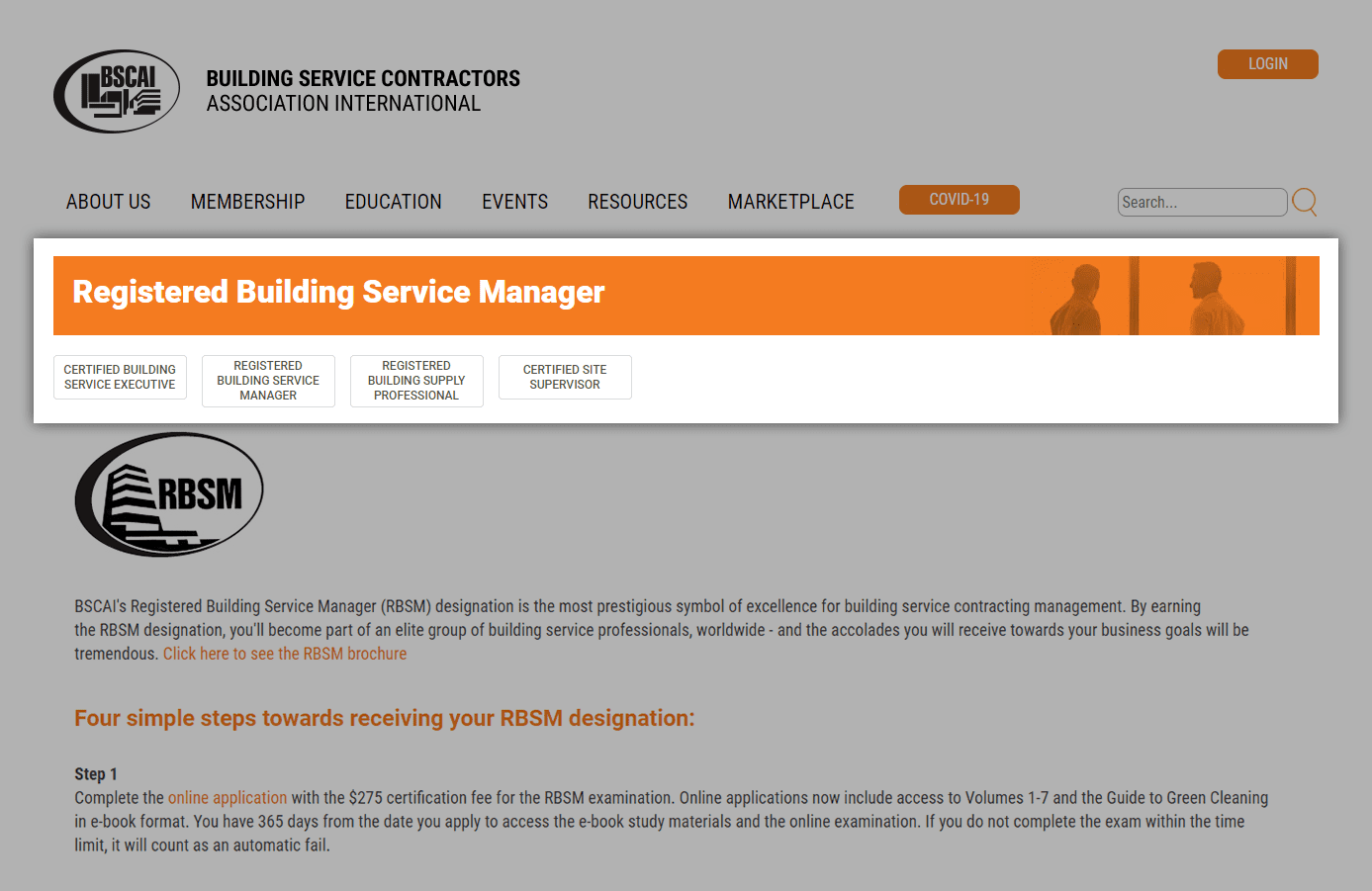
The BSCAI creates four courses that help people prove their knowledge of the cleaning, safety, and management of buildings. If you perform work for government agencies or large business complexes, you might benefit from these certifications. The two most commonly recommended are:
- Registered Building Service Manager (RBSM): At about $275, this course is a great way to familiarize yourself with OSHA safety, employee management, floor care, and more.
- Certified Building Service Executive (CBSE): With a cost of about $50, this course is a good one to help build a more successful cleaning business. It includes business law, industry considerations, inventory, employee management, quality control, taxes, and more.
Sanitation Cleaning Certification
If you specifically need sanitation certification, consider the following courses and certificates:
- IJCSA Medical Cleaning Certification: Covers bloodborne pathogens, chemical hazards, covid, PPE and more as it relates to cleaning companies. Learn more.
- Certified Health Care Environmental Services Professional (CHESP): The Association for the Health Care Environment offers this certification.
Specialized Cleaning Certification Organizations
- Portable Sanitation Association International (PSAI): Certifications for sanitizing porta potties.
- North American Power Sweeping Association (NAPSA): Certifications for street cleaning.
- Pool and Hottub Alliance (PHTA): Pool cleaning certifications
- National Association of Sewer Service Companies (NASSCO): Certifications for sewage and pipeline cleaning.
- United Association of Mobile Contract Cleaners (UAMCC): Power washing certifications
Which Certification Will Help Your Own Cleaning Business?
The goal of this blog is to provide you with as many cleaning certification options as possible. Each cleaning business will need to consider how each certification fits within your own business. What cleaning certifications would help your business most?




